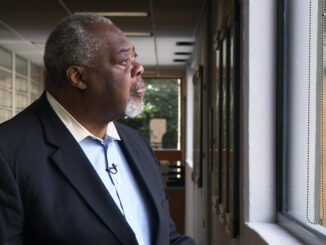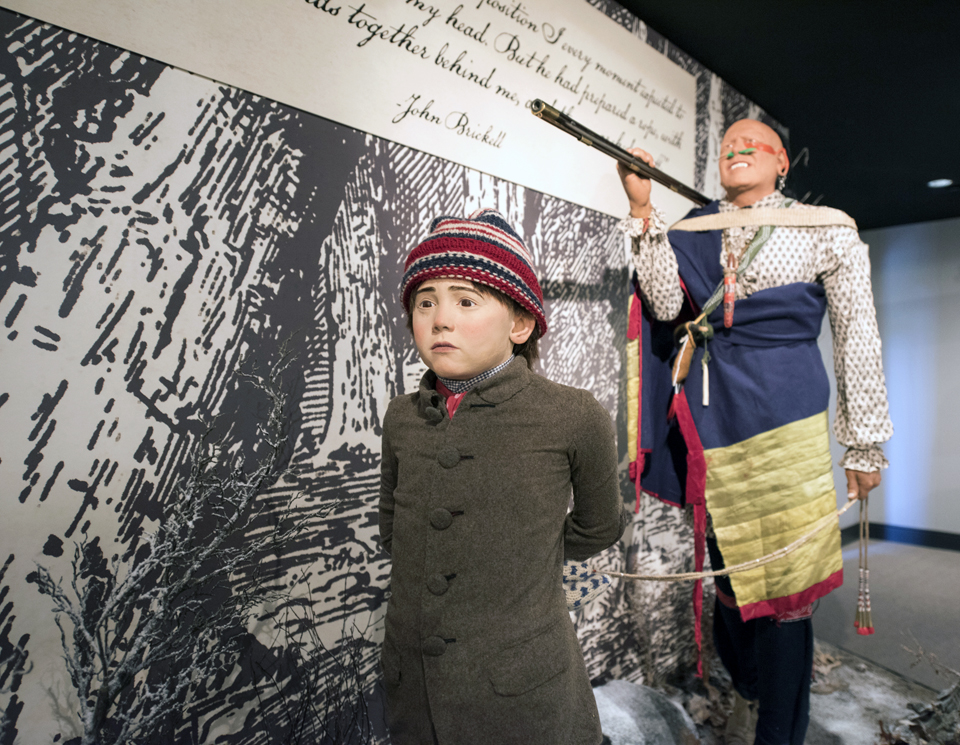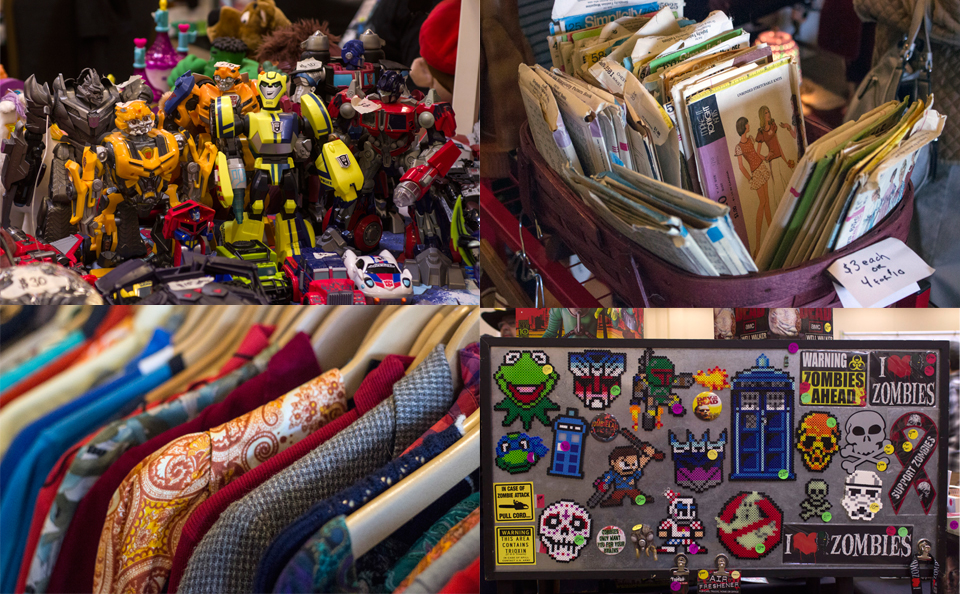
Freedom Summer honored
By: Seth Culp-Ressler | Asst. Features Editor
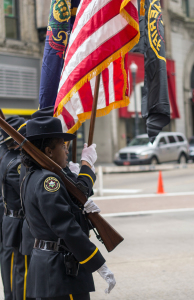
Despite the less-than-ideal looming weather, snapping drums, revving engines and enthusiastic chants could be heard in full force on Saturday as the 27th Annual African-American Heritage Day Parade rolled through town. Unwavering crowds lined both sides of Liberty Avenue, braving the blustery and soggy chill to join in celebration of heritage.
Shawn Hicks, volunteer with the African-American Parade Association and Director of Administration at the African American Chamber of Commerce, said that the goal of the parade is to celebrate and shed light on, as the name implies, African-American heritage.
“We’re trying to unify the efforts and honor and celebration and recognition of the African-American heritage throughout our community,” Hicks said.
This year’s parade, which was sponsored by Highmark, got off to a rocky start with a bout of rain amid the already frigid mid-forty degree temperatures, but spirits soon rose as the clouds parted and shed sunlight. Doris Carson-Williams, president of the African American Chamber of Commerce, narrated the parade. Mayor Bill Peduto later joined her up on the stage, after walking the parade route himself.
Participants in the parade were diverse, Hicks said, including local high school marching bands, local high school cheerleaders and fraternities throughout the region. The Obama Academy Marching Band, the United Rays Corvette Club and the Housing Authority of the City of Pittsburgh are just a few of the numerous businesses, organizations and performers who participated in this year’s parade. Certainly enough to keep the crowd entertained.
One of the focuses of this year’s parade was the Grand Marshall Sala Udin, according to Hicks. A former Pittsburgh councilman, Udin was a participant, or Freedom Rider as they were known, in the Freedom Summer, a civil rights campaign that’s 50th anniversary was the focus of this year’s parade.
Udin said that his specific role as a Freedom Rider was based in Mississippi’s Holmes County. His work was focused around integrating schools and lunch counters, registering people to vote and organizing the Mississippi Freedom Democratic Party, which aimed at getting civil rights activists elected to political positions. Their work wasn’t always taken too kindly by those opposed to the movement, according to Udin.
“It resulted in our being arrested and thrown in jail multiple times,” he said. “Usually beaten up pretty bad whenever you were arrested.”
Andrew Simpson, assistant professor of history, explained that the impetus behind the Freedom Summer of 1964 was to advance the civil rights movement in the southern United States. The campaign was created by the Council of Federated Organizations (COFO), an organization staffed mostly by members of the Student Non-Violent Coordinating Committee (SNCC), which had been experiencing increasing violence towards their voting registration drives throughout the South.
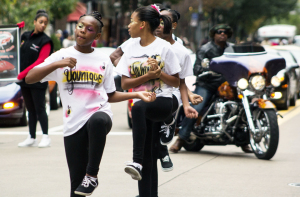
Simpson said that Freedom Summer volunteers were of mixed races, with many coming from universities around the country, and they took up the work to increase voter registration, all in hopes of empowering individuals in the fight for social and economic justice. “Freedom Schools” were also created, with the aim of drawing attention to “continuing lack of integration in Mississippi’s public education system.”
“Starting in June of 1964, over 1,000 volunteers headed south,” Simpson said. “They were immediately greeted with violence—within ten days three civil rights workers—James Chaney, Michael Schwerner, and Andrew Goodman were murdered outside of Philadelphia, Mississippi. Other volunteers continued their work of registering voters and educating residents through Freedom Schools.”
Simpson said that the Freedom Summer was directly responsible for a number of important milestones within the civil rights movement. The “Freedom Schools” helped to shed light on the issue of integration in public schools, and the Mississippi Freedom Democratic Party challenged the existing Democratic Party at the 1964 Atlantic City Democratic National Convention. The efforts to increase voter registration also led to the passage of a significant piece of legislature — the Voting Rights Act of 1965.
“The push for increasing voting rights and the deployment of large numbers of volunteers in service of this goal helped to lead to the passage of the Voting Rights Act of 1965 by showing members of Congress that there was a groundswell of support for full legal equality,” he said.
For Udin, it was nice to see recognition for all the participants who worked so hard, and risked so much, during the Freedom Summer. He said that at a recent conference he attended commemorating the 50th anniversary of the campaign he noticed that the Freedom Riders who participated went on to use their leadership skills to further fighting for equal rights for a variety of communities.
“It was evident that their participation in the civil rights movement provided them with the kind of leadership that made them lifelong leaders and activists in civil rights and human rights and women’s rights and the rights of the LGBT community. All of that started with their becoming involved in the Freedom Summer of 1964,” Udin said.
Italia, that’s amore!
By: Max Blechman | The Duquesne Duke
This past Sunday, the Heinz History Center held an Italian Heritage Day event that aimed to preserve and celebrate Italian heritage and cultural knowledge.
Melissa Marinaro, the curator of the Italian-American program at the Heinz History Center and organizer of the event, said the event’s goal was to help encourage a younger generation to explore their heritage.
“When I came on staff, about a year and a half ago, I noticed that with our public programming, our audience was an older generation,” Marinaro said. “I was looking to develop a program that would be appropriate for multigenerational families… a program that would encourage sharing between these different family members.”
Taking place throughout the whole museum, more than 600 attendees were able to visit multiple attractions from almost 30 Pittsburgh based organizations. These activities included Bocce lessons, taste testing traditional Italian foods and exploring their family trees in the Detre Library & Archives.
On the third floor, attendees were able to start off by tasting some traditional Italian food with the organization Slow Food Pittsburgh. The group proclaimed that it was only using “high quality, fresh, Italian ingredients” and attendees were encouraged to try everything from Ricotta to Parmesan Reggiano cheeses as well as a variety of oils and sauces with bread.
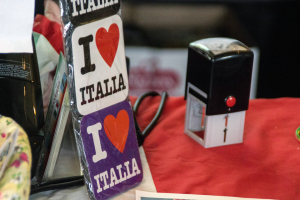
Then attendees could swing by the multipurpose room to play some Bocce with the Major League Bocce organization, or experience old-world gardening techniques with The Italian Garden Project.
Mary Menniti, of the Italian Garden Project, discussed the importance of her work of “recording, documenting and sharing” the gardening and food preparation techniques of Italian American immigrants. Many of these first generation immigrants are now in their 70’s and 80’s and the knowledge will soon be lost without careful preservation.
“Once this lifestyle is gone, a lifestyle of… knowing the earth, and knowing how to prepare these food. Those traditions are going to be lost,” Menniti said.
Her activities at the event included a program she titled “Farm Children of the 1900’s” which she described as a fun way to teach kids the same sort of skills their ancestors would have had as children at the turn of the century. This included identifying and preparing beans and seeds as well as preparing gnocchi noodles from scratch.
On the fifth floor, a bazaar was filled with tables for Pittsburgh-based Italian American organizations. Included were restaurants and catering services that prepared traditional Italian dishes, such as Common Plea Catering and Mancini’s Bakery. Also present were groups that actively seek to educate those who would like to learn Italian or connect with other Italian Americans, including Societá de Dante Alighieri which promotes Italian language and offer scholarships to students interested in studying in Italy.
On the sixth floor, attendees were able to take advantage of what curator Marinaro described as “one of the most complete collections of artifacts, archives and oral histories [of Italian Americans] in the country” and look into their own ancestry and locate where their family came from in Italy.
Mark Machi and Helene Manna, who were two of those in attendance, discussed the importance of their Italian heritage to them. They cited the community and values of Italian Americans as invaluable and the importance of passing those on to their children.
“My girlfriend always asks me, ‘How do you know so many people?’ I don’t know, I guess Italians just all know each other!” Helene Manna said with a laugh. “I just want my children to marry Italians, that says it all. I get really bummed when they’re dating non-Italians.”
Mark Machi noted the importance his heritage and celebrating Italian culture. “Well of course it’s important, it’s how I came into this world,” Machi said. “My parents instilled Italian values in me and I want to instill them in my children. It’s important to remind [my kids] of where we come from.”
Italian Americans are one particular group that seems to have a lot of pride in their culture and that led to the success of the event, but expect other cultures to be on display in the near future, according to Melissa Marinaro.
“This event served as a model for how we could do a full facility event for one specific culture,” she said. “I think there is a demand for that. Keep an eye out for that in the near future.”


